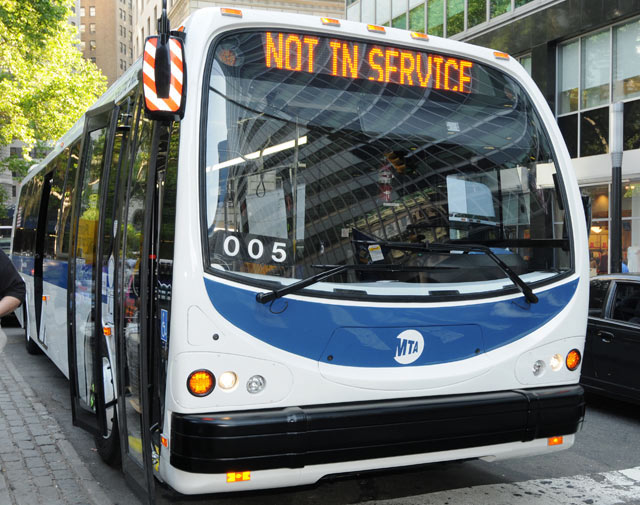In H.R.7 -- the transpo bill so backwards even the House couldn’t pass it -- the roads-only crowd threw transit riders under the bus, as it were, eliminating dedicated funding for transit, which was left to fend for itself off scraps from the general fund.

The best thing one can say about the bill issued by the conference committee last night is that it doesn’t include that draconian measure. But it sure doesn’t do anything to move transit forward in this country.
The bill maintains current funding levels at a time when more Americans are turning to transit but cities can barely maintain their existing services. Ridership has been growing steadily for countless economic and social reasons. But transit agency budgets haven’t grown with it, and Congress, with this bill, is surrendering its chance to help struggling cities and move toward a future where Americans have more transportation options.
The New Starts grant program for transit agencies is maintained, but suffered nearly a $50 million cut in funding. New Starts funding helps build new rail lines and busways. This is where the money to expand transit systems comes from, and it stays flat in this bill. A new subcategory of New Starts will help agencies maintain their existing stock of buses, trains, track, and other capital assets, as long as a 10 percent capacity increase will result from the investment, so there will be some added flexibility in the new bill. But that's hardly what you'd call progress in an era of rising gas prices and intensifying demand for walkable, transit-oriented places.
The Senate bill had also thrown a life-preserver to struggling transit systems by allowing them to use federal grants to maintain service during periods of high unemployment -- when agency budgets typically take a beating. In a previous incarnation, the operations flexibility was unconditional, but by the time the Senate had its way with it, the flexibility was only available when the community’s unemployment rate rose above seven percent. But by the time the conference committee had its way with it, the bill had shed even this modest protection for struggling transit systems.
Another major disappointment is the elimination of parity between the tax benefits commuters can get for parking and the benefits available for taking transit. Under the 2009 stimulus bill, the two were temporarily equalized, with $240 in commuting costs being tax deductible per month, but the transit benefit then reverted to its former level of $125 a month. The Senate sought to codify equality between the parking benefit and transit benefit but that, too, was stripped out of the conference bill.
For these reasons and many more, the 500 organizations in the Transportation for America coalition had this to say:
We are encouraged that Congress will avoid a shutdown of the program. Unfortunately, this last-minute, closed-door deal does little more than that. The bill ultimately looks and feels like what it is: A stopgap that is the last gasp of a spent 20th century program. It doesn’t begin to address the needs of a changing America in the 21st century.
The Senate had done the hard work of carefully crafting a forward-looking, bipartisan bill that passed with an overwhelming majority. Unfortunately, the negotiated conference bill moved closer to the House’s HR7, which never garnered enough votes to pass, even among GOP members. What has been billed as a “compromise” on transportation instead represents a substantial capitulation in the face of provisions threatened by the House that had no relevance to the transportation debate.
In many respects, the bill falls far short of progress.
In terms of demographics and household budget incentives, all the pieces seem to be aligning for a powerful shift away from wasteful single-occupancy vehicle use and toward transit: Gas prices are a constant reminder of the inaffordability of driving, the lackluster economy is leading more and more people to try transit, young people are ditching cars in ever-greater numbers -- even the heat wave oppressing 27 states right now calls to mind the unsustainability of a transportation system based on the private automobile. But Congress blew its chance to move the country's transportation policy forward, instead choosing to leave our air as polluted, our roads as congested, and our transit systems as broke as ever.





